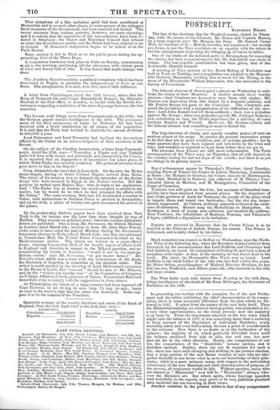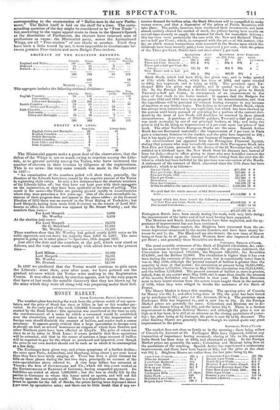In presenting our readers with the complete list of the
new Parlia- ment and the tables exhibiting the chief characteristics of its compo- sition, there is some necessary difference from the plan which we fol- lowed in 1837. It arises from the nature of the new body itself. Then the Ministerial majority, on extreme testing-points, was estimated at 16; a very close approximation, as the result proved : now the majority is at least 76. From the importance attached to the few votes which might turn the balance in 1837, it was something more than a curiosity to keep account of the disposition of individual Members ; every wavering mind, and even half-a-mind, became a point of consideration in the estimate. Now there is no doubt as to the inclination of the balance ; the majority of 16, which gradually dwindled down until the balance oscillated from side to side, one and one, has now shot out far in the other direction. Hence, one compartment of our list, the enumeration of the " Doabtfuls," became useless, and is therefore omitted. Besides, there are not fit materials for such a list : there has been such changing and shifting in the present election, that a large portion of the new House consists of men who are alto- gether doubtful in one sense—that is, as to our knowledge of their prin- ciples; while in a more intimate sense, with respect to the undoubting consistency of the new Members and their determination of purpose, or the reverse, all conjecture would be idle. Without question, many who. are classed as "Ministerial" now will be " Ministerial " always, who- ever the Ministers are. But others again, whose hustings speeches read doubtfully in the reports, may prove to be very judicious practical men, moderate but not wavering in their views. Another omission in the present tables is that of any compartment
corresponding to the enumeration of "Ballot-men in the new Parlia- ment." The Ballot itself is laid on the shelf for a time. The corre- sponding question of the day might be considered to be "Free Trade "; but, answering to the vague appeal made to them in the Queen's Speech at the dissolution of Parliament, the electors have returned men of professions as vague: the Ministerial party, minus the Agricultural Whigs, are all " Free-traders" of one shade or another. Until they have been a little tested by use, it were impossible to discriminate be- tween genuine Free-traders and mere Budget Free-traders.
ABSTRACT
OF THE ELECTION Liberal.. Tories. RETURNS.
Liberal Ma- Tory
jority. Mnjorsty.
England and Wales 199 303 104 Scotland 31 22 9
Ireland .a.
62 43 19
292 368 28 104
292
28
Majority 76
76
This aggregate includes the following sectional divisions—
Liberals. Tone. Liberal Ma- Tory jority. Majority.
English Counties 23 136
113
Universities
4 4
Cities and Boroughs 176 163 13
Scotch Counties 10 20
iO
Cities and Boroughs 21 2 19 • Irish Counties 39 25 14 • • University
2 2
Cities anti Boroughs 23 16 7 .
292 368 53 129
PROFIT AND LOSS.
Tory Gain.
English Cities and Boroughs English Counties Scotch Boroughs 2 Scotch Counties 5 3 Irish Cities and Boroughs 6 1 Irish Counties 4 1 78 38 The Ministerial papers make a great deal of the observation, that the defeat of the Whigs is not so much owing to reaction among the Libe- rals, as to greater activity among the Tories, who have increased the number of electors in their interest by diligence at the registrations. This is no news: the very same remark was made in the Spectator in 1837—
" An examination of the numbers polled will show that, generally, the disasters of the Liberals have been caused by the superior success of the Tories in registering their voters. In only a few instances have the absolute numbers of the Liberals fallen off; but they have not kept pace with their opponents on the registration, or they have been apathetic at the time of polling. The result is the same—the Tories are gaining ground rapidly in constituencies where they were powerless a few years ago. One of the most remarkable in- stances of their progress does not appear in the above tables : at the General Election of 1835 there was no contest in the West Riding of Yorkshire; but Lord Morpeth, having been made Irish Secretary on the return of Lord Mel- bourne to office, his refilection was opposed by Mr. Stuart Wortley ; and the numbers then were—
For Lord Morpeth 9,066 Mr. Wortley 6,259
At the election just over—
For Lord Morpeth 12,576 Sir G. Strickland 11,892 Mr. Wortley 11,489
These numbers show that Mr. Wortley had gained nearly 2,000 votes on his noble opponent, and cut down his majority from 2,807 to 1,087. The same process is going on in other placea."—Spectator, 19th August 1837. Just alter the date and the numbers at the poll, which now stand as follows, and the very same words apply with added force to the present time—
Lord Milton 12080 Lord Morpeth 12,031 Mr. Wortley 13,165 Mr. Denison 12,780 In 1837 we predicted that the Tories would continue to gain upon the Liberals : since then, year after year, we have pointed out the gradual advance which the Tories were making in the Registration Courts. It was often denied, by election-agents, and by the very papers that have at last made the notable discovery that they are blown up by the mine which they were all along told was preparing under their feet.
Liberal Gain.
38 31 23 1 1



























 Previous page
Previous page